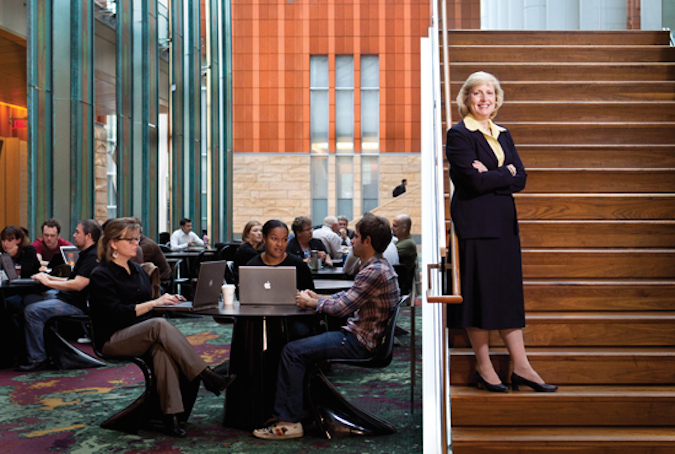 Administrators from the Ross School of Business at the University of Michigan unveiled a new curriculum for undergraduate business students this week that they hope will reshape the way business education is taught, as well as serve as a model for other leading business programs.
Administrators from the Ross School of Business at the University of Michigan unveiled a new curriculum for undergraduate business students this week that they hope will reshape the way business education is taught, as well as serve as a model for other leading business programs.
The redesigned Bachelor of Business Administration curriculum, called MERGE (Multidisciplinary Exploration and Rigorous Guided Education) will be launched this fall. It is one of the most significant overhauls of an undergraduate business curriculum at a top-ranked school in the last few years and the biggest overhaul at Ross since the program went from a two-year to a three-year program in 2006.
Ross Dean Alison Davis-Blake, who worked closely on the redesign, called the new curriculum, which has a focus on business and society and action-based learning, a “radically” new way of teaching business to undergraduates.
UNDERGRADUATE IMPACT ON BUSINESS EVEN BIGGER THAN MBA IMPACT
“Recent scandals and the financial crisis pointed to MBA education as the cause of the issues, but there are more people with undergraduate degrees working in business than there are with MBAs,” she said. “We really need to prepare undergraduates who are going to assume a proper role in society as a leader.”
The idea for the redesign came about as a result of Ross’ involvement in the National Undergraduate Business Symposium, a group of deans and directors from top-tier undergraduate business programs that meets annually to discuss ideas and trends in undergraduate business education.
DREW ON STUDIES BY THE ASPEN INSTITUTE TO INFORM THE OVERHAUL
The school first engaged in a two-year data collection and evaluation process with students, faculty and recruiters. In developing the curriculum, Ross was also able to draw on its relationship with the Aspen Institute’s Business and Society Program, which studies how schools weave social, environmental and ethics content into their curriculum.
Each school was required to take on a capstone project, and Ross decided to adopt a lofty one: an ambitious curriculum redesign. Davis-Blake and Lynn Wooten, Ross’ associate dean for undergraduate studies both new to the school at the time, were eager to tackle the project together. Wooten, a member of Aspen’s Undergraduate Business Education Consortium Advisory Committee, said the organization’s research helped shape many of the curriculum changes.
“We want our new sophomore class to look at business as a positive force,” Wooten said.
NEW CURRICULUM FEATURES ‘CULTURAL INTELLIGENCE’ & MAKING A ‘POSITIVE DIFFERENCE’
Ross’ approach to undergraduate business education is already somewhat different than most business schools. Students start the business program their sophomore year, rather than their junior year, as is customary at many other programs. That approach has allowed the school to more effectively integrate liberal arts with business studies in courses, Davis-Blake said.
The new curriculum will let the school take this approach even further, starting with a new required class called “Business and Leaders: The Positive Difference.” The class will place an emphasis on the relationships between the corporate, public and non-profit sectors, and how businesses can work with other entities to solve pressing social problems. In addition to business instructors, the school will bring in people from other parts of the university to teach the class, including a mathematician who will discuss the value of diversity and an alum from a leading foundation to speak about the role philanthropy plays in society.
Students will also be taught “cultural intelligence,” a method that will help them understand business problems and globalization in different contexts, and though the lens of ethnic, generational and organizational cultures, Wooten said.
This will enable them to get more out of their study abroad experience their junior year, she said.












Questions about this article? Email us or leave a comment below.